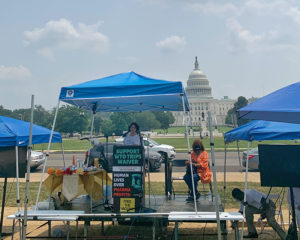Interfaith Solidarity for Global Vaccine Access
As vaccination rates continue to rise here in the United States, things have started to feel a little more normal. People are going back into the office, masks are being shed, and loved ones are slowly being reunited. However, it’s important to remember that so many around the world are not as lucky. Globally, access to vaccines disproportionately favors wealthy nations, leaving low- and middle-income countries unable to provide the necessary vaccines for their citizens. Many countries may not have reliable access to the vaccine until 2024.
On Tuesday, the American Humanist Association (AHA) joined international interfaith organizations at a prayer vigil on the National Mall. The vigil honored and mourned the more than 4 million lives lost to COVID-19 and called upon President Biden and other world leaders to take necessary measures to increase vaccine production and access globally.
With leadership from our partners, the event was grounded in prayer: prayer to god, to the great spirit, to the creator, and to the divine. Normally, we don’t get involved in prayer vigils (for obvious reasons), but in moments like this, demonstrating solidarity with those working toward the same ends is more important. So, the AHA offered to help in solidarity and we were welcomed (as always) with open hearts and arms. While final preparations were underway, multiple faith leaders reached out to us to make sure that their remarks and their calls to action were inclusive of our community. We were even asked to speak, and AHA staff opened the event with a welcome and a land acknowledgment. These meaningful efforts at inclusion were a bright spot in a vigil focused on the ongoing tragedy and human-made inequities of this pandemic. The visual of so many different traditions coming together to demand action was powerful.

AHA Policy and Social Justice Director Rachel Deitch speaks at the vigil.
And while the prayer may have focused on the transcendent; the calls to action were concrete. These are the steps needed to end the pandemic.
During the vigil, interfaith leaders called for the approval of the WTO TRIPS waiver, which would facilitate the manufacturing and distribution of safe and effective COVID-19 vaccines around the world. Organizing partners of the vigil also voiced their support of a global vaccination plan, which would ensure that every nation and person can access a vaccine by the spring of 2022.
We call upon Biden and Congress to take drastic measures toward ending the “vaccine apartheid,” a term used at the vigil to describe the current state of global vaccine distribution. We urge the US Government to invest $25 billion in a global vaccine manufacturing program that would source and produce materials, train personnel, and invest in regional manufacturing hubs around the world. Through this program, around eight billion additional doses of mRNA vaccines could be produced over the next year.
The COVID-19 pandemic has taken so much from so many of us around the world. We now have the science and vaccines to fight against the virus, but the pandemic doesn’t end until we’re all protected. “We’re all one human family,” was an expression that was repeated during this Tuesday’s vigil. In her opening remarks, AHA’s policy and social justice director Rachel Deitch said, “In this moment, we share a powerful conviction that every human being has an inherent dignity and as such, we come together to call for an equitable distribution of life-saving vaccines across borders. Where you live on this pale blue dot or the borders you reside within should not determine if you wait weeks, months, or years to access the protection of immunization.” This is our common call.

